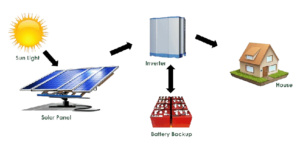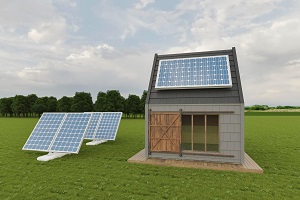Solar panel systems can be categorized into three main types based on their connectivity and functionality: grid-tied, off-grid, and hybrid systems. Each system type is designed to meet different energy needs, preferences, and geographical considerations. Here’s a breakdown of each system type:
1. Grid-Tied Solar Panel Systems
2. Off-Grid Solar Panel Systems
3. Hybrid Solar Panel Systems
Introduction to Off-Grid Solar Panel Installation
The off-grid solar system is a battery based, free nearby solar system that doesn’t bother with a utility lattice to enlighten your places. It is a finished solar setup with solar powered chargers, solar based battery, and solar panel inverter, and is ideal to ease up a home even in a distant area. This solar panel is more unmistakable as it accompanies a power backup.
Like each and every other nearby solar system, an off-grid solar panel utilizes a sun powered charger to retain daylight and convert it into power. In the day time solar oriented will run the associated burden and equilibrium energy will be put away in the solar system battery. So in the daytime, the solar system runs home apparatuses creating power utilizing daylight and stores the additional energy into the battery bank. What’s more, around evening time when there is no daylight, the apparatuses draw energy from the battery to continue to run. Thus, the system works constantly.
Before you jump into the solar world, you should gather each and every piece of data about the kind of solar system to be installed. In this article, you will find solutions to every one of your inquiries connected with an off-grid solar system.
Why Choose Off-Grid Solar Panels
Choosing off-grid solar panels is not just about being environmentally friendly; it’s also about embracing freedom and reliability. Unlike grid-tied systems, off-grid installations ensure you are not affected by power outages, providing a continuous power supply.

Omnetway’s Expertise in Off-Grid Solar Panel Installation
Omnetway stands out in the solar industry with its specialized focus on off-grid solar panel installations. With years of experience and a team of dedicated professionals, Omnetway is committed to delivering the best solar solutions to meet your energy needs.
Benefits of Off-Grid Solar Panel
1. Energy Independence
2. Environmental Impact
3. Cost Savings
4. Increased Property Value
5. Reliability
6. Supports Rural and Remote Areas
7. Government Incentives and Rebates
8. Technological Advancements
The Process of Off-Grid Solar Panel Installation by Omnetway
Omnetway’s installation process is meticulous and tailored to ensure customer satisfaction from start to finish. Here’s what the process entails:
Initial Consultation
The journey begins with an initial consultation to understand your energy needs, preferences, and financial considerations. This step is crucial for tailoring a solar solution that fits your specific requirements.
 Site Assessment and Design
Site Assessment and Design
Following the consultation, a comprehensive site assessment is conducted to evaluate the feasibility of installing an off-grid solar system. Based on this assessment, a custom design is crafted to optimize energy production and meet your needs.
Installation and Setup
With a design in hand, Omnetway’s skilled technicians proceed with the installation. They ensure that every component is correctly installed and configured for optimal performance.
Maintenance and Support
After installation, Omnetway provides ongoing maintenance and support to ensure your system continues to operate efficiently over the years.
Benefits of Choosing Omnetway for Your Off-Grid Solar Needs
Omnetway is not just another solar company. Here are some reasons to choose them for your off-grid solar panel installation:
Custom Solutions
Omnetway excels at creating custom solar solutions that are perfectly suited to your unique energy needs and environmental conditions.
Conclusion
Embrace the power of the sun with Omnetway’s expertly designed solar solutions.
FAQs
- What makes off-grid solar systems different from on-grid systems?
Off-grid solar systems operate independently of the public electricity grid, providing energy directly to homes or businesses without the need for external electrical sources. - Can off-grid solar systems power a whole house?
Yes, off-grid solar systems can power an entire house, provided they are appropriately sized and equipped with sufficient battery storage to meet the home’s energy needs. - What is the lifespan of an off-grid solar system?
The lifespan of an off-grid solar system typically ranges between 25 to 30 years, though individual components may have varying lifespans and may require replacement or maintenance. - How do I determine the right size system for my needs?
Determining the right size for an off-grid solar system involves calculating your daily energy usage and considering factors like location, sunlight hours, and energy efficiency goals. - What kind of maintenance is required for an off-grid solar system?
Maintenance for an off-grid solar system generally includes regular cleaning of solar panels, checking battery levels and connections, and ensuring the inverter and charge controller are functioning properly.


 Site Assessment and Design
Site Assessment and Design


Leave A Comment